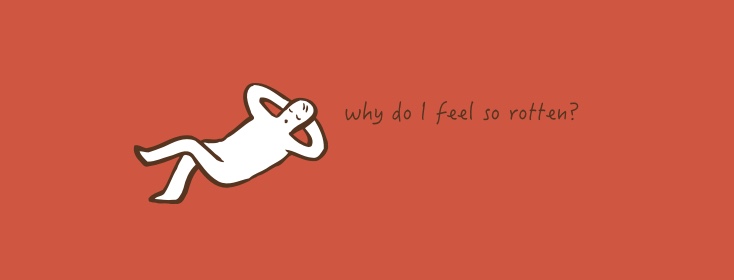Why Do I Feel So Rotten? Sickness Symptoms from RA
It’s been a rough few months with an increase in fatigue, a noticeable lack of energy, difficulty sleeping soundly, and low motivation levels. It just feels like I’m sick all the time. This recent episode caused me to investigate why I felt so bad and I stumbled upon something scientists call “sickness behavior”. The best way to understand this feeling is to think about what it’s like while fighting an infection like influenza or pneumonia.
Sickness symptoms of rheumatoid arthritis
In summarizing the source and symptoms of sickness behavior, researchers Dantzer and Kelly stated:
"It was subsequently shown that physiological concentrations of pro-inflammatory cytokines that occur after infection act in the brain to induce common symptoms of sickness, such as loss of appetite, sleepiness, withdrawal from normal social activities, fever, aching joints and fatigue."1
Such responses by the body are thought to be part of the recovery processes to illnesses. The body is likely preserving resources and energy in order to fight off the sickness.
What are proinflammatory cytokines?
According to Dantzer and his associated colleagues, it was reiterated that sickness behavior could be brought about by proinflammatory cytokines. They stated,
“The behavioral repertoire of humans and animals changes dramatically following infection. Sick individuals have little motivation to eat, are listless, complain of fatigue and malaise, lose interest in social activities and have significant changes in sleep patterns. They display an inability to experience pleasure, have exaggerated responses to pain and fail to concentrate. Proinflammatory cytokines acting in the brain cause sickness behaviors."2
The cytokines that are involved in autoimmune diseases like rheumatoid arthritis are implicated in sickness behavior. Increased levels of these cytokines are observed in patients with RA. The same symptoms are also observed in patients with other diseases that involve the immune system such as AIDS, coronary heart disease, cancer, and systemic infections.3-5
Sickness behavior due to cytokines
In one study, sickness behavior was even observed in volunteers who received a typhoid vaccine that increased the levels of inflammatory cytokines in the blood. People might act like such symptoms are “all in your head” but there are biochemical reasons behind these symptoms.6
The link between these cytokines and the symptoms may involve “crosstalk” between the nervous and immune systems. In characterizing the ultimate impact of this crosstalk, Jin and Fall stated:
“Immune upregulation and excessive cytokine production can lead to clinical symptoms and conditions referred to as ‘sickness behaviors.’ Symptoms of sickness behavior include fatigue, difficulty concentrating, sleep disruption, anxiety, and depression. These symptoms often accompany known immunological conditions such as autoimmune disorders.”7
Cytokine sickness behavior is linked to depressive symptoms and this occurs in both infectious diseases and inflammatory chronic diseases.Emotional issues and difficulty with cognitive functioning and are quite common in RA are can be directly linked to the overproduction of cytokines.8
What is the relation between cytokines and RA?
In autoimmune diseases such as rheumatoid arthritis, there is an increased production of certain inflammatory proteins called cytokines. They include tumor necrosis factor alpha (TNFa) and interleukins IL-1, IL-6, IL-17, IL-12, and IL-18.9
Many commonly used biologic treatments for RA target these cytokines. For example, TNFa inhibitor drugs include Enbrel, Humira, Remicade, Cimzia, and Simponi Actemra targets IL-6 and Kineret targets IL-1. Other RA treatments target associated parts of biochemical pathways that involve immune system parts and these cytokines. The idea is that if overproduction of these cytokines can be blocked, then symptoms of RA such as joint destruction can be controlled.
In addition, these treatments may assist with reducing fatigue experienced by RA patients. All of this makes sense in light of the sickness behavior theories discussed above. My rheumatologist once told me that the first sign a biological treatment was working was the patient experienced more energy. The opposite may also be true – if prolonged and increased levels of sickness symptoms are present, then treatments may not be working.10
There are several key takeaways from this link between autoimmune disease processes and sickness symptoms. Don’t feel guilty if you feel these symptoms. They are a normal and biological part of the disease. It’s not just in your head. Speak to your doctor if emotional and mental symptoms remain persistent. There are medical treatments that may help. Pace yourself if sickness symptoms are present. Finally, if sickness symptoms are persistent over time, speak to your rheumatologist about the potential lack of effectiveness of your treatment plan.
Community Poll
What flare symptom do you wish you could avoid the most?

Join the conversation